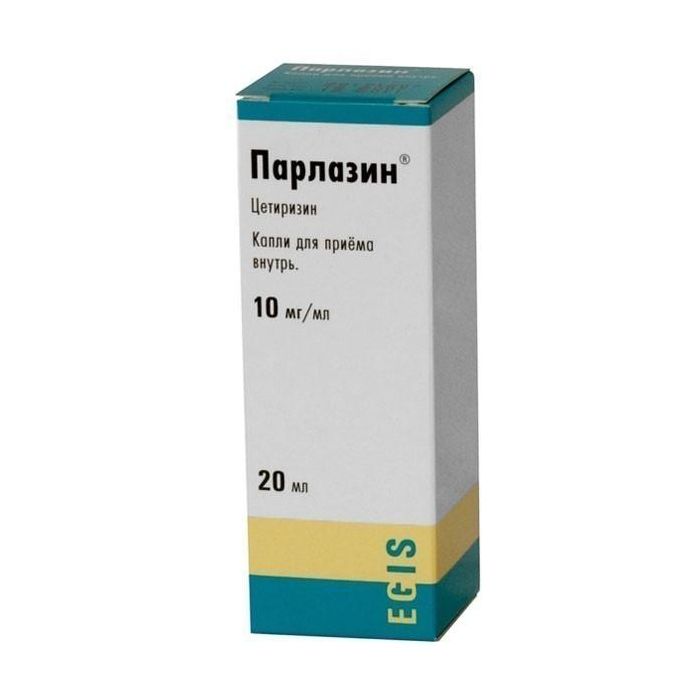Cetirizine | Parlazin oral drops 10 mg / ml 20 ml
Special Price
$33
Regular Price
$41
In stock
SKU
BID463284
Release form
Parlazin. Drops for oral administration.
Packaging
In a dark glass bottle 20 ml drops. In packing 1 bottle complete with a dropper.
Indications
Seasonal and perennial allergic rhinitis and conjunctivitis.
Pollinosis (hay fever).
Itchy allergic dermatoses.
Urticaria (including chronic idiopathic).
Quincke's edema.
Contraindications
Pregnancy.
Lactation (breastfeeding).
Children's age up to 1 year.
Hypersensitivity to cetirizine or other components of the drug.
Caution is advised to use the drug: In case of chronic renal failure of moderate or severe degree (dosage regimen correction is required).
In elderly patients (dosage adjustment required).
Use during pregnancy and lactation
The drug is contraindicated in pregnancy. In experimental studies, it was found that cetirizine does not have a teratogenic effect. However, there are no data from strictly controlled studies in humans.
Cetirizine is excreted in breast milk, the risk of suspected side effects in nursing infants exceeds the potential benefit for the mother, and therefore, it is contraindicated to take Parlazin during lactation.
Composition
1 ml drops for oral administration contain:
Active ingredients
Cetirizine dihydrochloride 10 mg.
Excipients
Glycerol, propylene glycol, sodium acetate, methyl parahydroxybenzoate, propyl parahydroxybenzoate, sodium saccharin, glacial acetic acid, purified water.
Dosage and administration
Adults and adolescents over 12 years of age are prescribed 10 mg (20 drops) 1 time / day, preferably overnight.
Children aged 6-12 are prescribed 5 mg (10 drops) 2 times / day (morning and evening) or 10 mg (20 drops) 1 time / day (evening).
Children aged 2-6 years are prescribed 5 mg (10 drops) 1 time / day. You can also divide this dose into 2 doses of 2.5 mg (5 drops in the morning and evening).
Children aged 1-2 years are prescribed 2.5 mg (5 drops) 2 times / day.
It is recommended that elderly patients and patients with renal insufficiency reduce the daily dose to 5 mg.
Drops before administration are dissolved in water.
Side effects of
From the central nervous system
Rarely - drowsiness (depending on the dose), feeling tired, headache, migraine, dizziness, anxiety (increased motor activity).
From the digestive system
Dry mouth, nausea.
The intensity of the above symptoms can be reduced, dividing the daily dose into 2 doses.
Allergic reactions
Rarely ( 2%) - Quincke's edema, rash
Drug Interaction
No clinically relevant interaction of cetirizine with glipizide, diazepam, cimetidine, azithromycin, pseudoephedrine, ketoconazole, erythromycin has been established.
When cetirizine is co-administered with theophylline (400 mg / day), a 16% decrease in total clearance of cetirizine is observed. The pharmacokinetics of theophylline do not change.
Overdose
Symptoms: often - feeling tired, drowsy. Children have anxiety and irritability, followed by drowsiness. When receiving a single dose of 50 mg, there may be a delay in urination, constipation.
Treatment: it is necessary to cause vomiting, to wash out a stomach. If necessary, conduct supportive and symptomatic treatment. There is no specific antidote. Hemodialysis is not effective.
Storage conditions
In the dark place at a temperature of no higher than 25 РC.
Expiration
4 years. Keep the vial open for up to 4 weeks.
Deystvuyuschee substances
Cetirizine
Terms of pharmacy leave
No
Submit your review to Earn 10 Reward Points click here to login
Write Your Own Review

